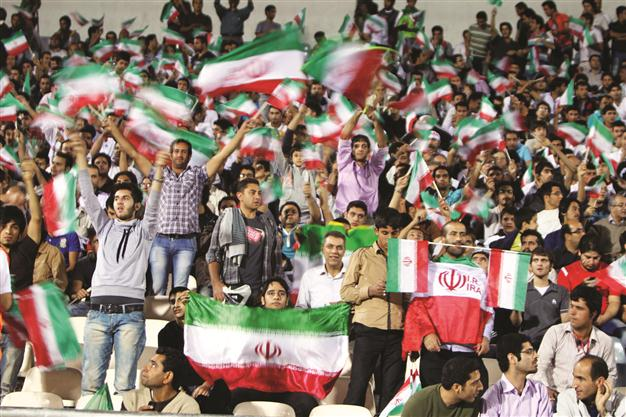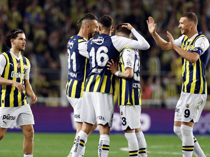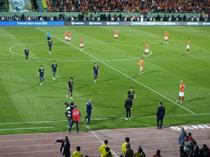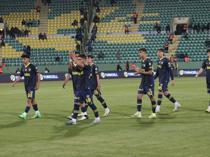Iranian Azeri football protests raise specter of regional battle
James M. Dorsey JAMES M. DORSEY - Hürriyet Daily News

Iranian fans cheer for their team during their 2014 World Cup Asian zone qualifying match against Bahrain in Tehran’s Azadi Stadium on Oct 11, 2011. The game staged some anti-government protests. AFP photo
Nationalist and environmental football protests in recent months at grounds in Tabriz, the Iranian province of East Azerbaijan’s capital, raise the specter of ethnic strife in the Islamic republic and a Turkish-Syrian-Iranian war using ethnic proxies.The protests come as regional tension mounts over the crisis in Syria as a result of President Bashar al-Assad’s eight month-old brutal crackdown on anti-government protesters.
The prospect of greater Turkish involvement in the Syrian crisis coupled with Turkey’s decision last weekend to impose economic sanctions on Syria alongside the Arab League opens the door to a potential tit-for-tat proxy war that would involve not only Syria and Turkey but also Syria’s main backer, Iran. Turkish officials worry that Syria and Iran, which have effectively halted security cooperation with Turkey, will step up support for Turkish Kurdish militants who in recent months have increased their attacks on Turkish targets.
Fears of a proxy war are fuelled by Turkey’s tacit support for the Free Syrian Army (FSA), which has been formed by Syrian military defectors that have attacked Syrian military targets.
The football protests in Tabriz signaling a rise in Azeri nationalist sentiment suggest that in a proxy war Turkey could support secessionists among its Turkic brethren in predominantly Azeri East Azerbaijan.
In the latest football incident in Tabriz, fans of Tabriz football club Tractor Sazi FC, a flashpoint of Iranian Azerbaijan’s identity politics that is owned by state-run Iran Tractor Manufacturing Co. (ITMCO), wore shirts with the Turkish and Azerbaijan flags and raised the flag of the former Soviet republic of Azerbaijan during last week’s league match against Fajr-e Sepasi of Shiraz, according to Iranian Azeri nationalists and Iranian blogs.
“[The] Iranian regime will charge them with separatism and even arrest them. The main [Iranian concern] is that the idea of Turkism is strengthening in South Azerbaijan,” News.Az quoted Saftar Rahimli, a member of the board of the World Azerbaijani’s Congress, as saying. Rahimli was referring to East Azerbaijan by its nationalist Azeri name.
A conservative, pro-Iranian website, Raja News, confirmed the incident, charging that football fans had employed “separatist symbols” and shouted separatist slogans during the match, according to The Meir Amit Intelligence and Terrorism Information Center. Raja News accused the fans of promoting “pan-Turkish” and “deviant objectives.” It urged authorities to ban nationalist fans from entering football stadiums.
The protests follow similar ones in September and October sparked by a refusal by the Iranian parliament to fund efforts to save environmentally endangered Lake Orumiyeh. There were also anti-government protests in Tehran Azadi Stadium during last month’s 2014 World Cup qualifier against Bahrain and at a ceremony in May after the death of Nasser Hejazi, an internationally acclaimed Iranian defender and outspoken critic of President Mahmoud Ahmadinejad.
Last week’s protests in Tabriz were the sixth time this year that anti-government sentiment spilled onto the football pitch, one of the few places that the strength of numbers and moments of intense passion encourage expressions of dissent. The Azeri protests are fuelled by an Azeri sense of being discriminated against.
A decision by security forces in early October to bar fans entry into the stadium during a match against Tehran’s Esteghlal sent thousands into the streets of Tabriz shouting “Azerbaijan is united” and “Long live united Azerbaijan with its capital in Tabriz.” Cars honking their horns choked traffic while scores were injured as security forces tried to break up the protest.
“Wherever Tractor goes, fans of the opposing club chant insulting slogans. They imitate the sound of donkeys, because Azerbaijanis are historically derided as stupid and stubborn. I remember incidents going back to the time that I was a teenager,” said a long-standing observer of Iranian football.
Iranian football pitches are battlefields for fans who view it as a venue to express dissent and for Ahmadinejad, a football fan that sees the game as a way to polish his tarnished image.
A 2009 cable from the U.S. embassy in Tehran disclosed by the whistle-blowing site WikiLeaks describes how Ahmadinejad has sought – with limited success – to associate himself with Iran’s national team in a bid to curry popular favor.
The Football Federation of the Islamic Republic of Iran (FFIRI) postponed league matches in Tehran in February in a bid to prevent celebrations of the 32nd anniversary of the Islamic Revolution from turning into anti-government protests inspired by the anti-government protests in Tunisia and Egypt that toppled presidents Zine El Abidine Ben Ali and Hosni Mubarak.
















